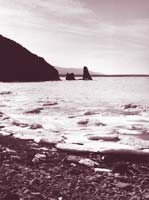Natural
Reflections
Sustaining Human-Ecological Well-Being
Are your consumer habits part of the problem or the solution?
 by Maureen Latta
by Maureen Latta
I saw a documentary recently about a horse trainer who helps
people with problem horses for whom no amount of training
seems to be effective. This "horse whisperer" was
willing to share his secret with the public. He had spent
many years patiently observing wild horses, including the
way they react to predators and to each other. He discovered
that horses have a type of language composed of subtle gestures
and eye movements. By adapting what he'd learned, this man
could get a horse to cooperate with him without breaking the
animal's spirit.
This kind of interaction between humans and non-humans is
rare. We live in a world that has been heavily influenced
by ideas contained in the first part of Genesis, which speaks
of humans freely subduing the earth and having dominion over
every living thing. From today's standpoint, this could be
the mission statement of economic globalization and an idea
that has already led to unprecedented ecological destruction.
Fortunately, there are other ideas within the Bible that
suggest a different type of relationship between humans and
the earth, one that is much more like the horse whisperer's:
"But ask now the beasts, and they shall teach thee; and
the fowls of the air, and they shall tell thee. Or speak to
the earth, and it shall teach thee; and the fishes of the
sea shall declare unto thee." (Job 12:7-8)
I had a conversation on this subject with Sr. Maureen Wild,
SC, an Earth Literacy educator based on Salt Spring Island,
BC. Thanks to educators like Wild, the new understandings
of science, and the writings of such authors as Thomas Berry
and Brian Swimme, an alternative to the "subdue and dominate"
model of human-earth interactions is being developed.
Earth Literacy presents a new model for viewing the earth
based on our more sophisticated understanding of the universe's
evolution. "The story of the evolution of earth needs
to be understood within the larger story of the universe,"
Wild said. Once we get a good sense of the whole universe
as we've come to know it, we can focus on earth.
"Earth over 4.6 billion years has been evolving in
all of its intricacies and subtleties and all its incredible
experiments over time…Then we focus on humans as they
have evolved in this little droplet of time, 2-4 million years.
Then we see how we have been relating to earth in the broad
sweep of evolutionary history — to soil, water, air,
animals, and plants… Then with that broad sweep of understanding
we start to reflect on the different functions of the earth.
We take our clues from what the earth says."
The practice harkens back to the indigenous peoples' relations
with the natural world. And Wild refers to passages in the
Bible that emphasize what she calls a "circle of relatedness."
"Emphasis has been on a sense of domination, but that
is not the only story that we have from our own tradition.
We need to reclaim those gems." She points to Genesis
9:12: "And God said, This is the token of the covenant
which I make between me and you and every living creature
that is with you, for perpetual generations."
"That tells us that God wants this inclusive kind of
covenant," Wild said. The hierarchical model has shaped
us deeply, and yet there is this other model that can shape
us differently. The earth-literate person learns how to look
to the earth's natural systems for guidance. When we really
observe the earth and take our cues from it, we see that earth
is self-healing, self-propagating, self-nourishing, self-educating,
self-governing, and self-emergent.
Wild says, "We have to be shattered or shaken in our
world views and how we've been shaped by culture and tradition
and story… and question it if it's been dysfunctional."
She believes that a new understanding has been creeping into
our culture over the last few decades, partly due to the dramatic
revolution in scientific knowledge that points to the fundamental
connectedness of all life. However, our way of thinking is
still seriously lagging behind.
That is why education is so important. Centres of ecological
learning — such as Genesis Farm in New Jersey (where
Wild served as director for several years), EarthCare Connections
and Genesis Land Conservancy in Saskatchewan, and Arcosanti
in Arizona — are just a few of the many sites of experimentation
and education in sustainable human-ecological well-being.
The most critical area needing to be influenced by Earth
Literacy-type models is economics, Wild said. Globalization
and consumerism are "driven by world views that are dysfunctional."
The "take, take" model is having a devastating impact
on the earth systems and on the world's growing poor. However,
as consumers we are all part of the problem, or the solution,
every time we make a buying decision. "We can use our
dollars to really choose something that's more sustainable.
We need to think about the global impact of our choices, but
we need to act locally."
Maureen Latta is a freelance
writer living in Saskatoon. This article is reprinted courtesy
of EarthCare Connections,
P. O. Box 2800, Humboldt, SK S0K 2A0. Phone: (306) 682-2407,
Fax: (306) 682-5416, Email: earthcare@sasktel.net,
Website: www.earthcare.sk.ca.
|
